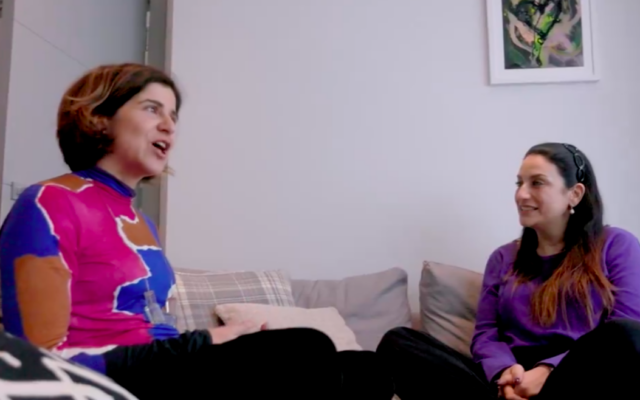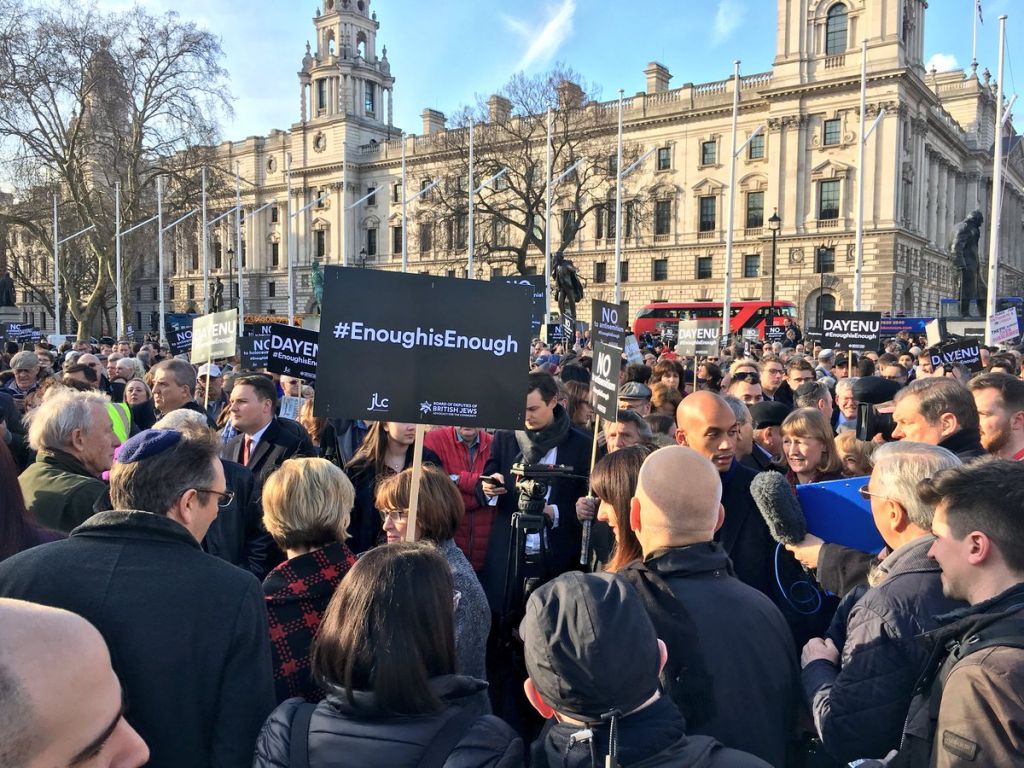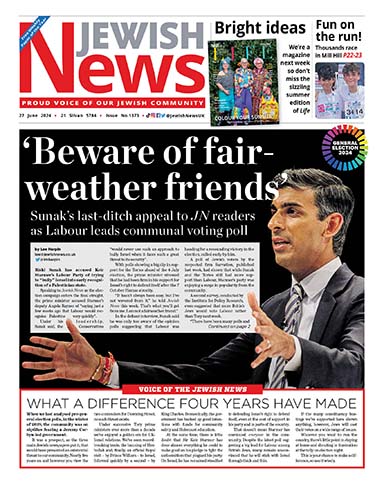OPINION:The moment I knew Labour’s major antisemitism problems were in the past
Barrister Adam Wagner reveals Labour has passed a test he himself had set for the party to prove it was serious about tackling anti-Jewish racism

There was a moment, two weeks ago, when I knew that the Labour Party’s major problem with antisemitism was in the past.
It related to a test I had set for the party, without even realising I had done so.
But before getting to that, I want to take you back to two secret meetings I had, six years ago.
It was 2018. Jeremy Corbyn was at the height of his power, after performing better than expected in the 2017 election.
The Labour antisemitism controversy seemed to be getting worse, with new controversies erupting every day.
The mural, the Zionists have no ‘sense of irony’ comment; and, more importantly for me, the seeming inability of Labour and to grapple with what was going wrong.
As a Jew on the left, I had thought I could play a bridging role. I had grown up through Habonim, a Jewish socialist youth movement, and assumed that I could connect with the passionate and idealistic new Momentum movement which Corbyn had inspired – impressively, from where I was standing.
But I kept banging my head against the brick wall of denial. So, I arranged two private meetings; one with a member of Corbyn’s office, the other with the Momentum team.
I had both meetings in my chambers. And both worried me hugely.
Corbyn’s aide told me that if the antisemitism issue was going to be solved, we would need to “work around” Corbyn himself, who was convinced that the Jewish community organisations were his enemies.
This shocked me, as although I had assumed it, it was startling to hear it from one of Corbyn’s most dedicated aides.
But it was the second meeting which, as a British Jew, I will never forget.
I met the Momentum executive team. The used almost identical words about Corbyn.

But it was the face of one of the young team members which will always stay with me.
He had been tasked to understand what was happening online. He told me that he had been given this job three months ago, and at first had been sceptical.
But what he had found in the pro-Corbyn Facebook groups and other places where the ‘very online’ movement congregated had greatly disturbed him.
He told me that antisemitism was rife in those places, and that hardcore antisemites were infiltrating them to ‘groom’ (I will never forget the use of that word) younger members of the movement.He showed me a complex spreadsheet he was building up to record and tackle the problem. He looked like he hadn’t slept for weeks.
I came out of those meetings realising that despite my own idealism, there was little point attempting to solve the crisis from within.
Fortuitously, I received a call from Gideon Falter at the Campaign Against
Antisemitism. CAA wanted me to work with them to persuade the Equality and Human Rights Commission (EHRC), the equalities regulator, to take unprecedented enforcement action against the Labour Party.
After painstaking and detailed work, from CAA and then the Jewish Labour Movement, the EHRC ruled in October 2020 that the Labour Party had breached equalities law.
The party had discriminated against and harassed Jewish people.
Corbyn, because of his reaction to the report, was ultimately expelled.
The EHRC investigation had two other important outcomes. First, that the report made clear that denial of antisemitism could itself amount to harassment.
This was a landmark finding, and put into legal language an experience that Jewish people had been suffering for years.
The second was the Labour Party had to comply with a detailed action plan, set by the EHRC.
This gave Keir Starmer, the then-new leader, a structure for his stated plan to rid the party of antisemitism.
I met him about this when he took over as leader in 2018, and he seemed to have an ironclad determination to make the party safe for Jews again – and he
seemed to well understand the cultural issues of denial which needed to be addressed.
I wanted to believe him, but like many others I was sceptical.
Four years later, Labour is practically a different party. And this brings me back to that moment a couple of weeks ago.
It concerns Luciana Berger.
I felt that amongst other Jewish women – especially Margaret Hodge, Louise Ellman and (then) Ruth Smeeth – Luciana was subjected to some of the most vicious, bullying treatment, hounded from her job as an MP in Liverpool.
But unlike the others, she seemed for a while to have been broken by what had happened – certainly not welcomed back with open arms; perhaps she, understandably, was reluctant to return.
Two weeks ago, I glanced at social media and saw a video. Luciana Berger was back campaigning for Labour, including for Sarah Sackman, my wonderful and dedicated barrister friend who is standing for Labour in my constituency.
I had been waiting for that moment. Labour is a broad movement and it is wrong to think that Jews can ever be complacent.
But from my perspective, having been so close to the events of those depressing years, I am as enthusiastic as I have ever been to vote.
I hope that others will see that “change” is not an empty Labour campaign slogan, it reflects reality for Jews too.
– Adam Wagner is a barrister at Doughty Street Chambers. He is writing in a personal capacity.

Thank you for helping to make Jewish News the leading source of news and opinion for the UK Jewish community. Today we're asking for your invaluable help to continue putting our community first in everything we do.
For as little as £5 a month you can help sustain the vital work we do in celebrating and standing up for Jewish life in Britain.
Jewish News holds our community together and keeps us connected. Like a synagogue, it’s where people turn to feel part of something bigger. It also proudly shows the rest of Britain the vibrancy and rich culture of modern Jewish life.
You can make a quick and easy one-off or monthly contribution of £5, £10, £20 or any other sum you’re comfortable with.
100% of your donation will help us continue celebrating our community, in all its dynamic diversity...
Engaging
Being a community platform means so much more than producing a newspaper and website. One of our proudest roles is media partnering with our invaluable charities to amplify the outstanding work they do to help us all.
Celebrating
There’s no shortage of oys in the world but Jewish News takes every opportunity to celebrate the joys too, through projects like Night of Heroes, 40 Under 40 and other compelling countdowns that make the community kvell with pride.
Pioneering
In the first collaboration between media outlets from different faiths, Jewish News worked with British Muslim TV and Church Times to produce a list of young activists leading the way on interfaith understanding.
Campaigning
Royal Mail issued a stamp honouring Holocaust hero Sir Nicholas Winton after a Jewish News campaign attracted more than 100,000 backers. Jewish Newsalso produces special editions of the paper highlighting pressing issues including mental health and Holocaust remembrance.
Easy access
In an age when news is readily accessible, Jewish News provides high-quality content free online and offline, removing any financial barriers to connecting people.
Voice of our community to wider society
The Jewish News team regularly appears on TV, radio and on the pages of the national press to comment on stories about the Jewish community. Easy access to the paper on the streets of London also means Jewish News provides an invaluable window into the community for the country at large.
We hope you agree all this is worth preserving.





















